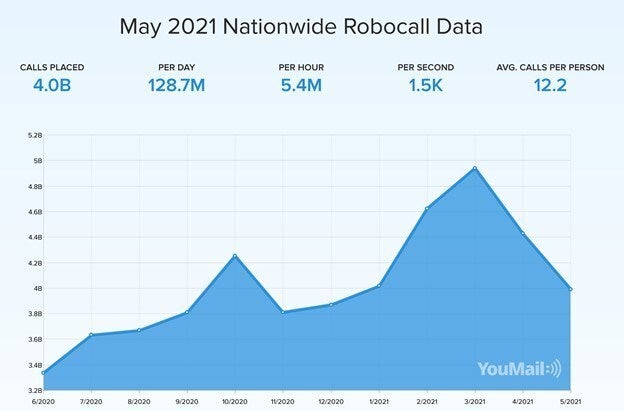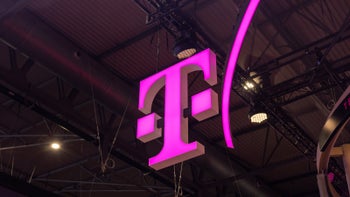Good news! Number of Spam/Scam calls dropped in May

The FCC's war on Robocalls succeeded in May as Americans continue to battle with spam and scam calls. According to YouMail, just under 4 billion of such calls were received in the states during May. That is a 9.9% month-over-month decline and the lowest level registered this year. In May, the number of Robocalls in the U.S. averaged 128.7 million calls per day and 1,490 calls per second, down from April's 147.6 million calls per day and 1,708 calls per second.
May saw the lowest number of spam and scam calls in the U.S. this year
But here's the problem. Even with the month-over-month decline, during the first five months of this year, those in the states received enough Robocalls (22 billion) to put it on a pace to reach a total of 52 billion Robocalls in 2021. During May, U.S. consumers answered 5.4 million scam/spam calls each hour and 1,500 per second. During the month, the average person received 12.2 Robocalls calls.

Thanks to Indian call centers and COVID, the number of spam/scam calls in the U.S. declined in May
Strangely enough, the COVID situation in India is partially responsible for the improved Robocall numbers in the U.S. As YouMail CEO Alex Quilici says, "We believe the decline is due to continuing and expanding lockdowns in India based on the prevalence of Covid-19 there, which once again has closed or reduced the capacity of call centers." Quilici adds that "It's great to see a second straight month of declining robocall traffic, but we aren't getting too excited about the decline."
Scam and telemarketing calls accounted for 63% of May's Robocall volume. During the month, scam calls declined 19% with an 8% drop in telemarketing calls. The two leading type of Robocalls in April, Car Warranties and Health-Related Scams, declined by nearly 100 million calls each during the month of May.
The cities with the most Robocalls in May were Atlanta, Ga. (154.5 million Robocalls, -7%) and Dallas, Tx. (147.3 million Robocalls, -6%). The states with the most Robocalls during the same time period were Texas (470.4 million Robocalls, -8%), and California (349.7 million Robocalls, -4%).


At the end of last month, the FCC announced that the larger voice providers in the U.S were now implementing the STIR/SHAKEN standards to block spoofing. This is when spam callers use fake phone numbers to make it appear as though their spam/scam calls are coming from a number you know, or one that is located near you. This gives you the incentive to pick up to see who is ringing you.
June 30th was the deadline set by the FCC for large voice providers to implement STIR/SHAKEN. Providers with fewer than 100,000 subscribers have two extra years (June 30th, 2023) to launch it.
STIR/SHAKEN will help voice carriers battle Robocalls according to the FCC
FCC Acting Chairwoman Jessica Rosenworcel said in a press release at the end of last month, "At last, STIR/SHAKEN standards are a widely used reality in American phone networks. While there is no silver bullet in the endless fight against scammers, STIR/SHAKEN will turbo-charge many of the tools we use in our fight against robocalls: from consumer apps and network-level blocking, to enforcement investigations and shutting down the gateways used by international robocall campaigns. This is a good day for American consumers who – like all of us – are sick and tired of illegal spoofed robocalls."
In the same release, the FCC said that "While STIR/SHAKEN will improve the quality of caller ID information, it does not mean the call itself is legitimate. This improved information will help verify the phone number from which the call was made – or flag that it is not verified – and help blocking services both at the consumer level and before the call reaches the consumer. But consumers should remain vigilant against robocall scammers. The FCC is committed to continuing to fight against malicious spoofing and scam robocalls."










Things that are NOT allowed: